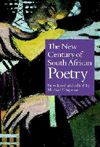South African Literature

PAGE 9
The New Century of South African Poetry
Introduced and edited by Michael Chapman
South Africa, with its dramatic history, has produced an excitingly rich and varied store of poetry. This anthology provides a comprehensive glimpse of this poetry, in a number of the country's languages (though here all translated into English).
One of the major themes has been the ugliness of the apartheid system. Mongane Serote for example, in "City Johannesburg," a poem that is both a protest and a plea, describes the bitter experience of working in the city and then returning to his segregated impoverished township. Sipho Sepamla constructs in "To Whom It May Concern" a sardonic testimonial highlighting the way the laws and bureaucracy undermine the humanity of black people. Mafika Gwala, in "Kwela-ride," paints a vivid grim picture of an African, who has forgotten his pass, being taken away in a police van.
Apartheid sent many people to prison. In "Letter to Martha, 4" Dennis Brutus offers a poignant and forceful sketch of an aspect of prison life. In Oswald Mbuyiseni Mtshali's "Boy on a Swing" one of the boy's childlike questions is: "Why was my father jailed?"
But South African poetry isn't all about oppression. Ruth Miller, in "Penguin on the Beach," offers a lovely evocation of a penguin that seems afraid to enter the sea. Mazisi Kunene, in "Vision of Peace," presents striking images of nature and of childhood, while Douglas Livingstone's "Steel Giraffes" uses images of the dockyard where he says goodbye to a woman to crystallize his overwhelming grief. "Testimony" by Chris Mann is a memorable love poem.
Return to South Africa's bookshelf.
Introduced and edited by Michael Chapman
South Africa, with its dramatic history, has produced an excitingly rich and varied store of poetry. This anthology provides a comprehensive glimpse of this poetry, in a number of the country's languages (though here all translated into English).
One of the major themes has been the ugliness of the apartheid system. Mongane Serote for example, in "City Johannesburg," a poem that is both a protest and a plea, describes the bitter experience of working in the city and then returning to his segregated impoverished township. Sipho Sepamla constructs in "To Whom It May Concern" a sardonic testimonial highlighting the way the laws and bureaucracy undermine the humanity of black people. Mafika Gwala, in "Kwela-ride," paints a vivid grim picture of an African, who has forgotten his pass, being taken away in a police van.
Apartheid sent many people to prison. In "Letter to Martha, 4" Dennis Brutus offers a poignant and forceful sketch of an aspect of prison life. In Oswald Mbuyiseni Mtshali's "Boy on a Swing" one of the boy's childlike questions is: "Why was my father jailed?"
But South African poetry isn't all about oppression. Ruth Miller, in "Penguin on the Beach," offers a lovely evocation of a penguin that seems afraid to enter the sea. Mazisi Kunene, in "Vision of Peace," presents striking images of nature and of childhood, while Douglas Livingstone's "Steel Giraffes" uses images of the dockyard where he says goodbye to a woman to crystallize his overwhelming grief. "Testimony" by Chris Mann is a memorable love poem.
Return to South Africa's bookshelf.



